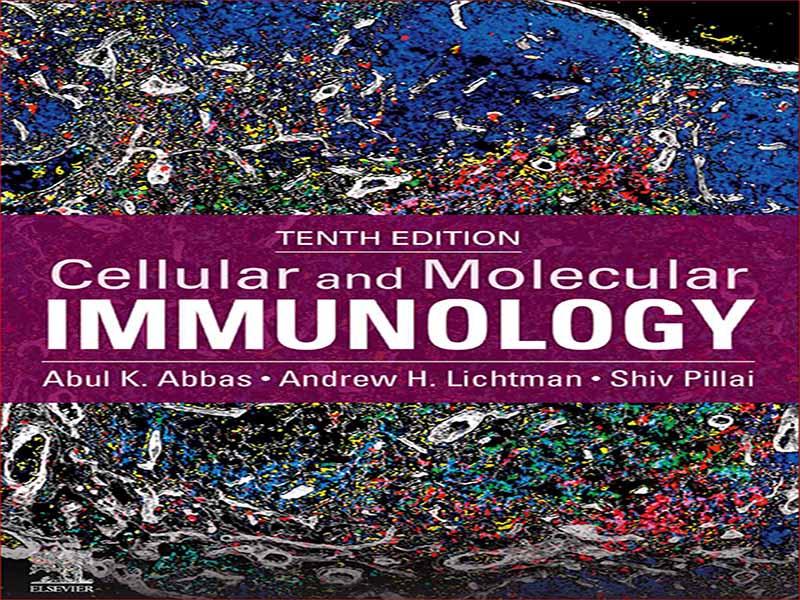- عنوان کتاب: Cellular and Molecular Immunology
- نویسنده: Abul K. Abbas, MBBS
- حوزه: ایمونولوژی
- سال انتشار: 2022
- تعداد صفحه: 1735
- زبان اصلی: انگلیسی
- نوع فایل: pdf
- حجم فایل: 31.69 مگابایت
این ویرایش دهم از ایمونولوژی سلولی و مولکولی شامل بازنگریهای اساسی است که پیشرفتهای علمی اخیر و کاربردهای بالینی علم را منعکس میکند، در حالی که ما در عین حال سبک واضح و خوانایی را حفظ کردهایم که نمونهای از نسخههای قبلی بوده است. ارائه اطلاعات جدید ما در درجه اول بر مفاهیم مهم متمرکز است و طول کتاب را به میزان قابل توجهی افزایش نداده است. ما همچنین بخش های زیادی را برای افزایش وضوح، دقت و کامل بازنویسی کرده ایم. حوزه ایمونولوژی فراتر از ایجاد اصول اساسی مکانیسمهای پاسخهای ایمنی به بکارگیری این اصول برای درک و توسعه درمانهای بیماریهای انسانی حرکت کرده است. انقلاب در درمان های ایمونولوژیک در 20 سال گذشته فوق العاده بوده است. بهویژه برای ایمونولوژیستها خوشحالکننده است که برخی از مبتکرانهترین و مؤثرترین روشهای ایمنی ایجاد شدهاند، زیرا علوم پایه به بلوغ رسیدهاند و مکانیسمهای پیچیده فعالسازی و تنظیم ایمنی با جزئیات بیشتر توضیح داده شدهاند. هیچ کجا ارتباط بین علوم پایه و پزشکی بالینی قویتر از توسعه روشهای ایمنی درمانی سرطان جدید نشان داده نشده است. در سراسر کتاب، ما توجه ویژه ای به ارتباط بالینی ایمونولوژی و زیربنای علمی بیماری ها و درمان های انسانی داشته ایم. همانطور که ما این مقدمه را می نویسیم، همه گیری SARS CoV-2 در سراسر جهان گسترش یافته است. علم ایمونولوژی برای روش مقابله با این چالش از اهمیت حیاتی برخوردار است و ایمونولوژیست ها در یادگیری چگونگی ایجاد بیماری توسط ویروس، نحوه درمان آن، و چگونگی ساخت واکسن های موثر، نقش اساسی دارند. علاوه بر این جنبههای ترجمهای ایمونولوژی، ما مفاهیم اساسی را نیز هر جا که درک جدید قابل توجهی وجود داشته است، به روز کردهایم. برخی از نمونههای این پیشرفتهای اساسی عبارتند از: درک بهتر ماکروفاژهای ساکن بافت و زیرمجموعههای سلول T حافظه، مکانیسمهایی که بوسیله آنها التهاب و حسگرهای اسید نوکلئیک واکنشهای ایمنی ذاتی را تحریک میکنند، توالی رویدادها در پاسخهای آنتیبادی وابسته به سلول T، و مکانیسمهایی که توسط آنها فرار تومور از یک حمله ایمنی را می توان غلبه کرد.
This tenth edition of Cellular and Molecular Immunology includes substantial revisions, reflecting recent scientific advances and clinical applications of the science, while at the same time we have maintained the clear and readable style that has been typical of previous editions. Our presentation of new information focuses primarily on the important concepts and has not significantly increased the length of the book. We have also rewritten many sections for increased clarity, accuracy, and completeness. The field of immunology has moved beyond establishing fundamental principles of the mechanisms of immune responses to applying these principles to understand and develop therapies for human disease. The revolution in immunological therapies over the last 20 years has been extraordinary. It is especially satisfying for immunologists that some of the most innovative and effective immunotherapies have been developed because the basic science has matured and the complex mechanisms of immune activation and regulation have been elucidated in increasing detail. Nowhere has the link between basic science and clinical medicine been demonstrated more forcefully than in the development of new cancer immunotherapies. Throughout the book, we have paid special a ttention to the clinical relevance of immunology and the scientific underpinnings of human disease and therapies. As we write this preface, the SARS CoV-2 pandemic has spread throughout the entire world. The science of immunology is of critical importance to the way we confront this challenge, and immunologists are front and center in learning how the virus causes disease, how we can treat it, and how we can develop effective vaccines. In addition to these translational aspects of immunology, we have also updated basic concepts wherever there has been significant new understanding. Some examples of these fundamental advances include a be tter understanding of tissue resident macrophages and memory T cell subsets, mechanisms by which inflammasomes and nucleic acid sensors stimulate innate immune responses, the sequences of events in T cell–dependent antibody responses, and mechanisms by which tumor evasion of immune a ttack can be overcome
این کتاب را میتوانید بصورت رایگان از لینک زیر دانلود نمایید.
Download: Cellular and Molecular Immunology




































نظرات کاربران